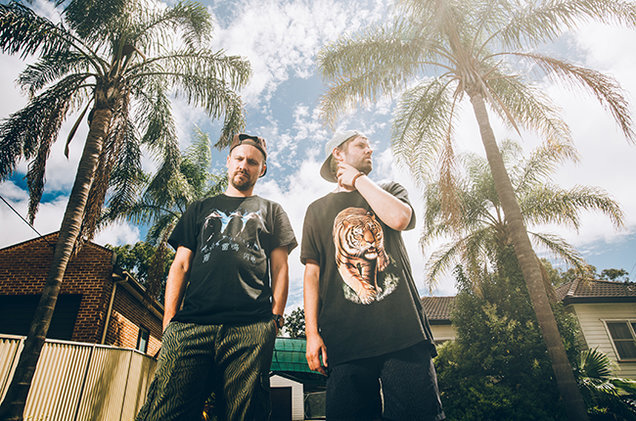The Road to Hermitude's Dark Night

Luke Dubs of Hermitude sheds light on the Australian electronic music scene.
[Updated] Australia has one of the smallest populations of any continent in the world, but it is home to musicians who have hit the industry in a major way--AC/DC most famously, but also Flume, Knife Party, Tame Impala and Hermitude, who will open for Flume Wednesday night at The Orpheum. Hermitude's Luke Dubber and Angus Stuart are known professionally as Luke Dubs and El Gusto respectively, and Dubs jokes that Australian artists are so hot that people ask him what's in the water.
Not surprisingly, Hermitude's roots are less magical. Dubs' father was a trumpet player and Stuart's father was a blues guitarist, which exposed them to playing, making, and listening to music all their lives. Their experiences and models helped the duo see the sort of commitment and passion that they needed to succeed. Dubs and Gusto met at a very young age, and played together in a high school band, Funk Injections, run by Gusto's father. This afterschool project is where they found their love for hip-hop and electronic music, and they found a home for their interest in reggae and Afrobeat when they formed another group, Explanetary. During that time, they developed a close relationship with their Australian beats and hip-hop label Elefant Traks. For a while, each of them had been producing beats separately. It wasn't until years later when, for the first time, the two of them took control of El Gusto's father's studio together. They sat down and started playing around trying different patterns and chords until they heard something they liked. With their minds finally united, the seed was planted. The two of them were all they needed, according to Dubs, and they never looked back.
They formed Hermitude in the early 2000s. Elefant Traks put out Hermitude's first vinyl-only Imaginary Friends EP, which made Hermitude a part of the tightly knit Australian electronic music community fairly early in their career."There is a very small scene in Australia due to its relatively small population, so everyone is tight and knows each other," Dubs says.
They first discovered Flume through his remix of another producer, Onra. However, Flume's career and relationship with Hermitude really started when he remixed Hermitude's "Hyperparadise." "That began the movement," Dubs says.
The movement he refers to is the electro hip-hop sound that Australia is often recognized for. "The 'beats' scene was not really big until us or Flume," he says. Australia is small country so the scene hangs out, especially at festivals. Hermitude is also close with female up-and-comer Alison Wonderland, who they "see more in the States than in Australia." Alison Wonderland will be performing to Voodoo Music and Arts Experience this year, along with fellow Australian What So Not.
"The Presets were one of the first to break through on the electronic scene," he says. "We know both of them very well, as friends from Sydney. Seeing them explode worldwide was really inspiring for us," Dubs says. The Presets' success made it easier for Hermitude to envision its own success not simply on a local level but an international one. The incubator for success was an underground scene, though. "There was a lot of good [electronic] music going on in the underground in Australia," Dubs says. "'Frigid' is an electronic music night in Sydney every Sunday at a pub where you could just drink beer and watch electronic music." This weekly event exposed Dubs and Gusto to lots of different sounds that inspired them to be creative. Watching other Australian producers instilled the duo with motivation and confidence to keep producing more music and perfecting their art.
In Australia, one of the most effective ways of getting noticed as an artist was to be featured on the popular radio program Triple J. According to Dubs, "Triple J broadcasts all over Australia and is instrumental in breaking bands. If you get airplay on this station, then you're on your way to a successful career." Triple J reviews the demos of unknown artists, and getting recognized by the station helps with touring and getting on festival lineups.
Hermitude's latest album Dark Night Sweet Light debuted at Number One on the Australian music charts, which made evident the support they continue to get from home. The U.S. version of the album includes a number of bonus tracks that add vocals to the previously instrumental tracks. How do they decide which tracks get vocals and which don't? "We know pretty early on if a track is suited for vocals," Dubs says. "Instrumental songs that stand out as strong melodic tracks don't need help to get them across the line. Songs that are more percussive tend to lend themselves to being paired with vocals." They know in the very early stages of a song's recording process whether it needs vocals. New Orleans native Pell is featured on the bonus track version of the song "Ukiyo" because Hermitude loved his style. "Ukiyo" already had a really strong vocal hook, but Pell took it to a different level," Dubs says.
Hermitude is very aware of their role as musicians and know what strengths and advantages they have individually, as well as collectively. "Gusto has always had a background in percussion, while I have always been on the melodic side of things," Dubs says. While in the studio, they typically gravitate to their respective comfort zones, but switching it up allows them to create something truly unique. Dubs explains, "We both have different flavors we were brought up on. I grew up playing jazz piano, while El Gusto was a drummer. [Hermitude's] music is something that only happens when we produce together. If we produce on our own, it sounds very different than in a collaborative effort."
Updated Sept. 13, 10:22 p.m.
The Flume/Hermitude show is Wednesday, not Monday as first written. The text has been changed to reflect this correction.






